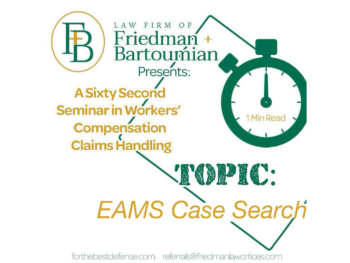There are times when a workers’ compensation claims administrator will admit industrial injury but deny disability benefits due to a nature and extent defense. In addition, some claims professionals are confused when to acknowledge an event as being an incident as opposed to an accident. The purpose of today’s blog is to explore the nature and extent defense and the difference between an accident and an incident.
The Cambridge Dictionary defines an accident “as something bad that happens that is not expected or intended and that often damages or injures someone.” Workers’ compensation expands the definition under LC § 3208 to include disease arising out of employment. In addition, LC § 3208.1 and § 3208.3 further expands the definition to include both specific and cumulative injury along with psychiatric injury as well.
An incident is defined as “an event, especially one that is bad or unusual.” There is subtle difference between an accident and incident. Injury may occur as a result of an accident, but usually not from an incident. Allow us to demonstrate using a true example: After an employee did a fabulous job at work, the supervisor gave him a congratulatory pat on the back. Two weeks later the employee filed a work comp claim asserting that the pat on the back was the cause of his low back pain.
The claims adjuster acknowledged an accident but raised “nature and extent” as a defense. In doing so the adjuster committed two very serious procedural errors. First of all, when nature and extent is raised, it means the employer “admits” industrial injury but questions its “duration” and “degree.” Also, by acknowledging that an accident occurred (instead of calling it an incident) and by raising nature and extent as a defense, the applicant was relieved of their burden to prove industrial injury. By raising a nature and extent defense the claims adjuster admits injury but only questions its seriousness and duration. It would have been far better for the claims administrator to simply have acknowledged that a minor “incident” (not accident) had occurred that did not rise to the level of injury and place the burden on the applicant to prove otherwise.
A simple misunderstanding of when to use certain terminology, such as “incident v. accident” or “nature and extent,” can make a huge legal difference and turn a non-compensable claim into a multi-hundred-thousand dollar exposure. We at Friedman + Bartoumian are aware of these differences and are available to partner with any employer or administrator in need of our services.


Leave a Reply